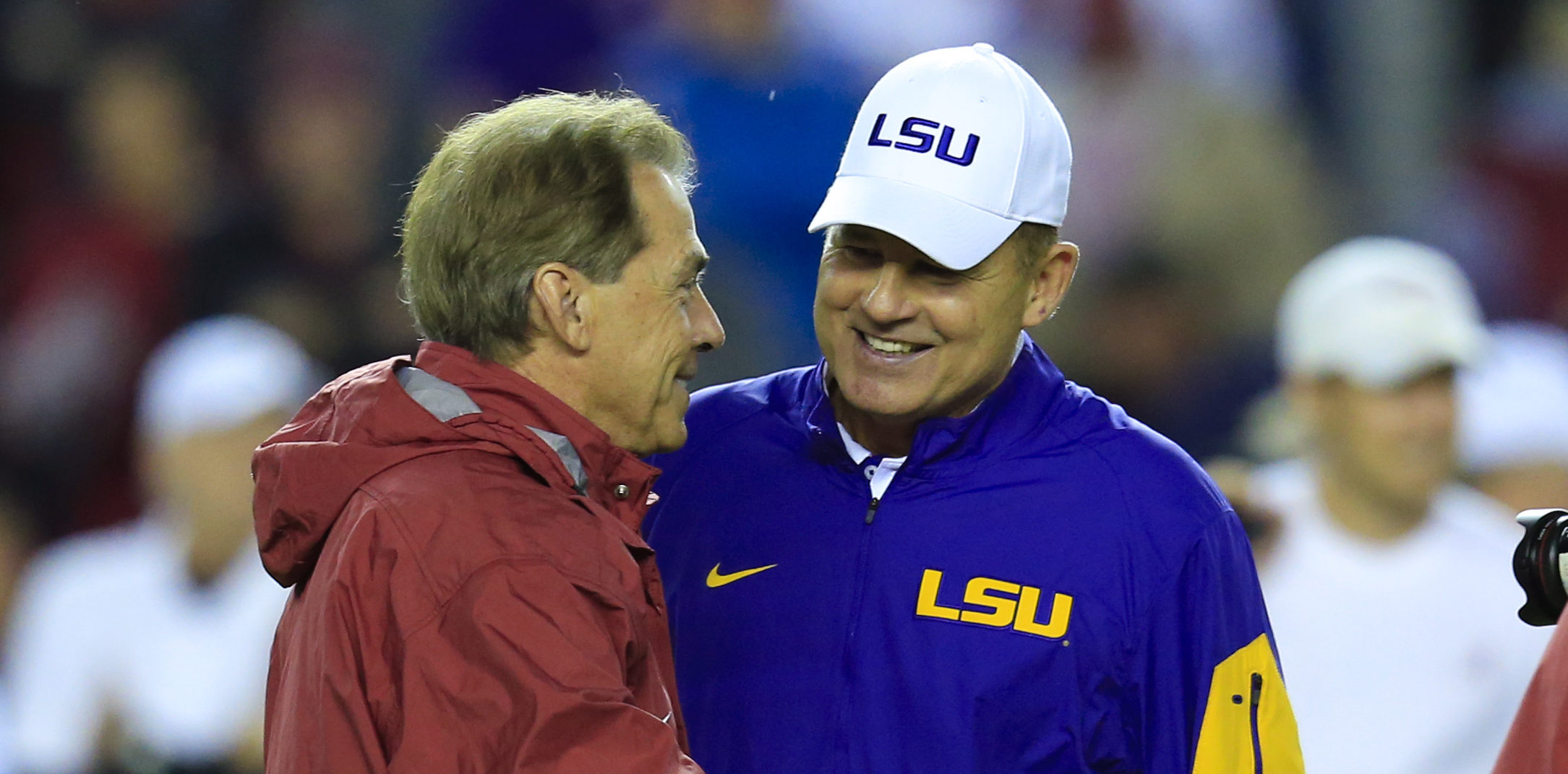
How many SEC coaches have been fired since Nick Saban arrived at Alabama?
To determine how great a shadow Nick Saban has cast over the rest of the SEC since arriving at Alabama, one only needs to look at the number of head coaching changes at the conference’s other programs.
In 2007, Saban returned to the SEC and joined the Crimson Tide. He remains the only head coach who has survived the decade.
RELATED: 38 days of drama that led to Alabama hiring Nick Saban
Much of the turnover at other schools can be linked to the success Saban has had in that time – four national championships, five SEC championships and seven division titles.
Outside of Saban, Mississippi State’s Dan Mullen, who was hired in 2009, is the longest-tenured coach in the conference. The likes of Mark Richt, Les Miles and Urban Meyer, some of Saban’s biggest rivals, are gone.
0: That’s how many SEC coaches past and present have a winning record against Nick Saban.
The SEC no longer resembles the one that he joined over a decade ago — 22 coaches have departed. Here are all of the head coaches who have been fired during Saban’s reign.
* Denotes a coach who resigned or retired from the job.
Replaced after 2007 season
*Houston Nutt, Arkansas (Tenure: 1998-2007, Record: 75-48): Nutt’s resignation had little to do with Saban and more to do with fan frustration and swirling controversies. Under Nutt, the Razorbacks had become a force to be reckoned with, and he had won the SEC’s coach of the year in 2006. Only three days before his resignation, Nutt led Arkansas to a 50-48 victory against eventual national champion LSU.
Ed Orgeron, Ole Miss (2005-07, 10-25): This was Orgeron’s first head coaching job. The Rebels were largely ineffective under Orgeron, and they never topped four wins in each of his three seasons. He was fired after blowing a 14-point lead to Mississippi State in the season finale.
Replaced after 2008 season
*Tommy Tuberville, Auburn (1999-2008, 85-40): Tuberville’s resignation after the 2008 season wasn’t expected, but the coach told school officials he needed time away from the game. His final game with the Tigers was a 36-0 loss to Saban and the Crimson Tide, the first Alabama victory in the Iron Bowl since 2001.
Sylvester Croom, Mississippi State (2004-08, 21-38): Croom holds a special place in history as the first African-American head coach in the SEC, paving the way for the likes of Kevin Sumlin and Derek Mason. He inherited a program that was mired in NCAA sanctions and was not one that many deemed a threat in the conference. Croom won eight games in the 2007 season, but he was asked to resign after a 4-8 campaign in 2008.
Phil Fulmer, Tennessee (1992-2008, 152-52): Some could argue that Fulmer was the Saban of his era in the SEC. The Tennessee legend won more than 150 games in his career, including the inaugural BCS National Championship Game. A slow start in 2008 led many Vols fans to wonder if Fulmer’s best days were behind him, and he was asked to step down after the season.
[table “” not found /]Replaced after 2009 season
*Rich Brooks, Kentucky (2003-09, 39-47): After being away from the college game for almost a decade, Brooks accepted a job with Kentucky, which was on probation from the previous staff. Brooks helped turn the Wildcats into a respectable team, even rising as high as No. 8 in the AP Poll during the 2007 season. He retired after the 2009 season after undergoing a procedure to remove skin cancer from his leg during the season.
*Lane Kiffin, Tennessee (2009, 7-6): Kiffin’s now-infamous tenure with Tennessee was as interesting as it was short. Following the sustained stability Fulmer provided, Kiffin led the Vols to some notable victories and humbling losses, including a two-point loss to Saban and Alabama. He left after the 2009 season, one year into a six-year deal, to accept the head coaching job at Southern Cal.
*Bobby Johnson, Vanderbilt (2002-09, 29-66): Johnson had one winning season and one bowl appearance but four two-win seasons before retiring prior to the start of the 2010 season.
Replaced after 2010 season
*Urban Meyer, Florida (2005-2010, 65-15): Meyer was Saban’s one true SEC rival. While at Florida, he won two BCS National Championships and had a 1-1 record against Alabama in SEC championship games. Meyer left the Gators citing health reasons after the 2010 season but resurfaced a year later at Ohio State.
Robbie Caldwell, Vanderbilt (2010, 2-10): Following Johnson’s unexpected retirement, Caldwell, Vanderbilt’s offensive line coach, was promoted to interim head coach. The Commodores ended the season with a seven-game losing skid and Caldwell announced he would step aside after the team’s final game, although it’s unlikely he would have been given a permanent job.
Replaced after 2011 season
Bobby Petrino, Arkansas (2008-11, 34-17): Petrino accepted a job with the Razorbacks in the midst of his first season with the Atlanta Falcons. Arkansas made consistent improvements under Petrino and finished the 2011 season with an 11-2 record and the No. 5 spot in the final AP Poll. After his motorcycle-crash scandal, Petrino was fired in the spring of 2012.
Houston Nutt, Ole Miss (2008-11, 24-26): After leaving Arkansas, Nutt accepted a job with Ole Miss to replace Orgeron. He reached nine wins in each of his first two seasons before falling to two wins in his final year. Nutt lost 12 consecutive SEC games in his final two seasons. He was fired before the end of the 2011 season but allowed to finish the season.
Replaced after 2012 season
John L. Smith, Arkansas (2012, 4-8): After three seasons under Petrino at Arkansas, Smith left to become the head coach at Weber State. Following Petrino’s dismissal, however, Smith came back to the Razorbacks without coaching a game at his new program. Although Smith was announced as the team’s head coach, he was not retained by the Razorbacks after a 4-8 season.
Gene Chizik, Auburn (2009-12, 33-19): Chizik is remembered mostly for helping Auburn claim the national championship in the 2010 season behind Heisman Trophy-winner Cam Newton. Outside of that 14-0 run, which included an improbable comeback against Saban’s Tide – his lone victory against Alabama – he was just 19-19 as a head coach. After a 3-9 season in 2012, Chizik was fired.
Joker Phillips, Kentucky (2010-12, 13-24): Kentucky had diminishing returns under Phillips, going from six wins in his first season to two wins in his last year. Phillips’ Wildcats never faced Saban. He was fired after a 1-9 start in 2012 but allowed to finish out the year.
Derek Dooley, Tennessee (2010-12, 15-21): Like Phillips, Dooley could not stop a slow decline during his three seasons. The Vols slipped from six wins in 2010 to four wins under Dooley in 2012, and he was 0-3 against Alabama. Dooley was fired before the end of the 2012 season and replaced by Jim Chaney for the team’s final game.
Replaced after 2013 season
*James Franklin, Vanderbilt (2011-13, 24-15): Franklin did the seemingly impossible: find success at Vanderbilt. The Commodores went to bowl games in each of his three seasons and finished with nine wins in his final two years, although Franklin was 0-1 against Saban. In 2012, Vanderbilt finished ranked in the AP and coaches’ polls for the first time since 1948. He left after the 2013 campaign to accept a job at Penn State.
Replaced after 2014 season
Will Muschamp, Florida (2011-14, 28-21): The man tasked with replacing Meyer, it appeared that Muschamp would keep the program humming after winning 11 games in his second season. The 2012 season proved to be high point of Muschamp’s tenure, however, and he was dismissed after winning just six games in his final year. Florida was 0-2 against Alabama under Muschamp.
Replaced after 2015 season
Mark Richt, Georgia (2001-15, 145-51): One of the few coaches who endured much of Saban’s time at Alabama, Richt was dismissed after failing to take Georgia to the same heights as the Crimson Tide during the latter half of his career. One pivotal moment came in the 2012 SEC Championship Game against Alabama, which ended with Georgia falling 5 yards short of a win and likely national championship berth. Richt was 1-3 against Saban’s Tide, and his only victory came in Saban’s first season with Alabama.
*Gary Pinkel, Missouri (2001-15, 118-73): Like Richt at Georgia, Pinkel was essentially an institution at Missouri. While many expected the Tigers to struggle upon joining the SEC, Pinkel led them to back-to-back division titles before slipping to only five wins in 2015. Health forced Pinkel to retire following the 2015 campaign.
*Steve Spurrier, South Carolina (2005-15, 86-49): Spurrier took South Carolina to previously-untouched heights and cemented his status as one of the greatest coaches in SEC history. He led the Gamecocks to their first division title in 2010 and backed it up with three consecutive 11-win seasons. Spurrier stepped down midway through the 2015 season. At South Carolina, Spurrier was 1-1 against Saban, including a 35-21 upset against a No. 1-ranked Alabama team in 2010.
Replaced after 2016 season
Les Miles, LSU (2005-16, 114-34): Few men combatted Saban in the same way as the one who replaced him at LSU. Miles led the Tigers to a national championship in 2007 and consistently reached 10 wins. With a lockdown defense that rivaled Alabama’s, LSU was a primary challenger in the SEC West. Miles finished with a 3-7 record against Saban, but he was 3-3 before to the 2012 season. In the end, Miles’ inability to adjust to a shifting offensive game, like Saban did, led to his demise early in the 2016 season.






